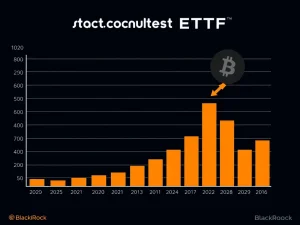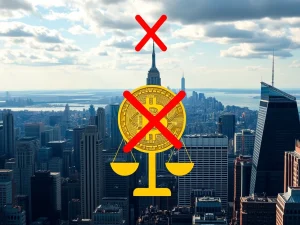Strategic Taiwan Lawmaker Proposes Bitcoin National Reserve

The world of finance is constantly evolving, and nations are exploring new strategies to secure their economic future. A significant development for those interested in cryptocurrencies comes from Taiwan, where a lawmaker is making a bold proposal: consider adding Taiwan Bitcoin to the national reserves.
Taiwan Lawmaker Ko Ju-Chun Advocates for Bitcoin
Taiwanese legislator Ko Ju-Chun recently proposed a groundbreaking idea at a national conference: allocating a small percentage of Taiwan’s national reserves to Bitcoin. This suggestion is part of a broader strategy to diversify reserve assets and potentially hedge against increasing global economic uncertainty.
Ko Ju-Chun, a legislator at-large in Taiwan’s Legislative Yuan, announced via social media that he had advocated for Bitcoin investment by the Taiwan government crypto holdings during the National Conference on May 9th. His rationale centers on Bitcoin’s potential role as a hedge amidst rising global economic risks. He urged Taiwan to consider recognizing Bitcoin alongside traditional assets like gold and foreign exchange reserves to bolster the nation’s financial resilience.
Why Consider a Bitcoin National Reserve?
Ko Ju-Chun highlighted several reasons why a Bitcoin national reserve could benefit Taiwan:
- Hedge Against Uncertainty: Amidst global inflation and geopolitical tensions, traditional currency values can fluctuate significantly. Bitcoin is seen by many as a potential hedge against such volatility.
- Export-Oriented Economy Risks: As an export-driven economy, Taiwan is particularly susceptible to fluctuations in its national currency, the New Taiwan dollar. Diversifying reserves could mitigate this risk.
- Unique Properties: Bitcoin has operated for over 15 years, boasts a fixed total supply, is decentralized, and resistant to censorship. These attributes make it distinct from traditional assets.
- Embargo Resistance: In intense geopolitical situations, traditional assets held abroad might face embargo risks. Bitcoin, due to its decentralized nature, may not face the same threat.
Taiwan currently holds significant reserves, including 423 metric tons of gold and $577 billion in foreign exchange, which includes investments in US Treasury bonds. Ko Ju-Chun argues that in a scenario of increased currency volatility or regional conflicts, relying solely on these traditional assets might not ensure security and liquidity.
Ko Ju-Chun’s Specific Proposal
While recognizing that Bitcoin is not the ‘only solution’ to economic challenges, Ko Ju-Chun Bitcoin advocacy focuses on adding a ‘small proportion’ of the cryptocurrency to the diversified asset mix. This would serve as a tool for sovereign asset allocation, risk hedging, and provide backup capacity for Taiwan’s financial system.
He previously suggested a potential allocation of a maximum of 5% of a specific $50 billion reserve towards Bitcoin. This measured approach emphasizes integrating Bitcoin as one component within a broader, more flexible financial strategy framework.
Bitcoin as a Digital Asset
Quoting former Dean Chen Chong, Ko Ju-Chun likened Bitcoin to the ‘gun of the digital era.’ He further suggested it could be considered the ‘gold of the digital era’ or even ‘silver’ or ‘gunpowder.’ The underlying message is that Bitcoin represents a powerful new tool that a wise nation should understand and potentially utilize, rather than letting its potential remain solely in the hands of others.
This discussion comes as Taiwan is showing signs of becoming a more crypto-friendly jurisdiction. The Financial Supervisory Commission is reportedly pushing for institutional trials of crypto custody services later in 2024. This contrasts sharply with mainland China’s continued hostile stance, which banned most crypto activities in 2021.
Conclusion: A Strategic Discussion on Bitcoin’s Role
The proposal by Ko Ju-Chun to explore a Bitcoin hedge within Taiwan’s national reserves marks a significant moment. It highlights the growing recognition among some policymakers of Bitcoin’s potential utility beyond speculative investment, viewing it as a strategic asset for national financial resilience in an unpredictable global landscape. While still a proposal, it opens the door for important discussions about how nations can adapt their financial strategies in the digital age.








